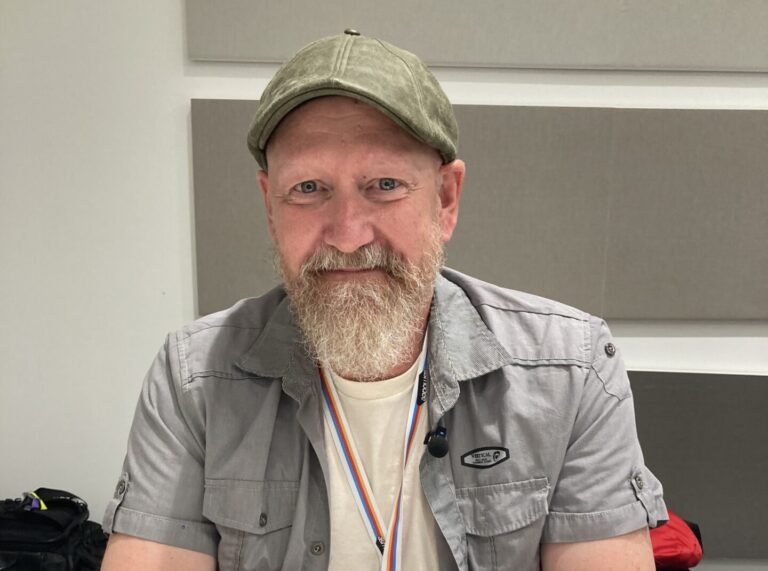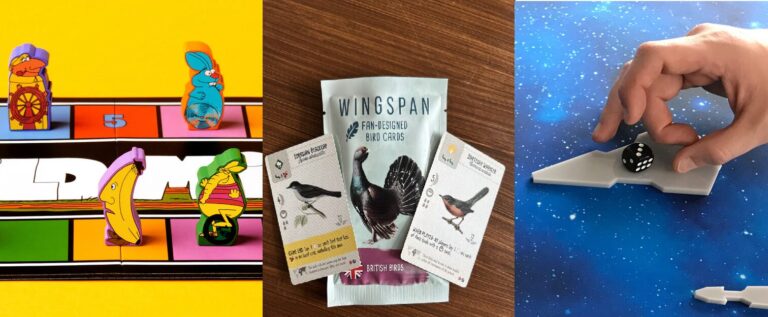
“A lot of luck and many contacts”: How small Swiss publisher Treecer tackled pitching Microsoft to create the Zoo Tycoon board game
Approaching large companies to use their IP in board games can be a daunting task – and they don’t come much bigger than $3tn computing giant Microsoft. That didn’t put off two-person Swiss board game publisher Treecer, though, whose successful pitch ended up with more than 5,000 backers committing about $600,000 to the Zoo Tycoon: The Board Game Kickstarter. Treecer co-founder Marc Dür took time out from managing the crowdfund for the game’s New Shores expansion – which has raised almost $500,000 itself so far – to tell BoardGameWire how his company went about securing the licence, how their approach to crowdfunding has changed over the years, and lessons they learned from the original Zoo Tycoon campaign.
BoardGameWire: What’s the design history of Zoo Tycoon? Did you already have a zoo game design in the works when you approached Microsoft for the licence, or did the design come later?
Marc Dür: The development of Zoo Tycoon has taken several years and has kept us busy from time to time. There were several working designs, but they didn’t feel right from a thematic point of view, so we threw everything overboard several times and started again. When we contacted Microsoft, the game was complete (besides the artwork of course, which was then influenced by Zoo Tycoon).
Your track record comprises Darwin’s Choice, Tipping Point and P’achakuna. How important was that back catalogue to pitching for Zoo Tycoon, and could you have succeeded without it? Were you ever worried you needed more published games, or a bigger hit, such as a Top 100 on BGG or a particular amount of sales?
The actual games in our catalog were almost completely irrelevant to Microsoft, especially their numbers on BoardGameGeek. I don’t even think anyone [who was involved in the decision] at Microsoft knows BGG. It is definitely important to have a professional appearance, which includes many things, i.e. a nice web presence, professional-looking products, a good range (which in our case doesn’t just consist of games) and of course a positive track record. In addition to these factors, the decisive factor for Microsoft was probably the fact that we count WWF, Greenpeace, zoos etc. among our customers, that we pay a lot of attention to sustainability and that we know/respect the Zoo Tycoon IP very well.
How did you go about securing the licence from Microsoft? Can you talk a little about the process that involved? Was it a quick road to ‘yes, sure’ from Microsoft, or were there particular hurdles you had to get past?

That was quite complex. First of all, you have to find out how to get to the right person at Microsoft. With a lot of luck and many contacts, I found the right person. We had one or two interviews and then we had to put together a professional application/business plan. My contact person was very helpful because he told us exactly what Microsoft was looking for, and also checked the whole dossier again in advance. We therefore always felt quite confident that it would turn out well. Then, one or two months later, we got the “yes”. But it wasn’t finished after that.
The actual contract negotiations took another three to four months. Not because we had any major requirements or Microsoft demanded impossible things, but simply because a contract with Microsoft can quickly run to 30 pages and is not actually made for a ‘small’ board game, but for huge merchandise contracts with huge toy manufacturers/distributors. This means that many of the clauses in these contracts make no sense in our specific case. In the end, it almost failed due to complex insurance issues. But fortunately, a solution can be found for every problem if both parties are interested in working together.
How did you rate your chances of acquiring the licence, and why did you think you might be successful?
As mentioned before, we had a really good contact person at Microsoft. In our first call, he mentioned that he was a big board game fan himself, and that he thought a Zoo Tycoon game would be a great idea. I knew then that it would turn out well. And there was never actually a ‘red flag’ during the whole process, i.e. they always made sure that a solution was possible. This naturally builds trust and this trust was not disappointed. But of course this also shows that every deal requires a bit of luck. If our contact hadn’t been so benevolent, we certainly wouldn’t be talking about Zoo Tycoon today, as this board game adaptation would not exist.
If you hadn’t been able to get the Zoo Tycoon IP, or if the deal had fallen through, what would you have done? Did you have other IP options in mind, or would you have put the game out as a non-IP ‘build a zoo’ game?
There aren’t that many Zoo IPs out there. But if Zoo tycoon hadn’t worked, we would have had a second option up our sleeve. We already created a communication channel with Planet Zoo and would certainly have expanded it. It’s hard to say whether that would have worked, but thematically it would have been a great match. If we hadn’t been able to strike a deal with one of them, we would have simply launched the game on Kickstarter without an IP. The campaign wouldn’t have performed much worse, I’m certain of that. But the IP makes a lot of things easier, e.g. with advertising, reviewers etc. and you generally have to explain a lot less because the IP already stands for something.
Zoo Tycoon raised about $600,000 from over 5,000 backers – do you think you’ll exceed that with the expansion and 2nd edition of the base game?
Expansion campaigns are always a bit difficult, because the number of potential customers get smaller. This is because the expansion is only of interest to customers of the base game (in our case around 10k people). For new customers, the entry level is also quite high, as they are not just looking at the base game, but the whole package, i.e. expansion plus base game. Before the campaign, we would have been very happy with around $400,000. But with the campaign progress I’ve seen so far, I’d say there’s a realistic chance of even surpassing the first campaign, which would be fantastic.

This will be the first and final expansion, similar to Darwin’s Choice. What was behind your decision to go the ‘one expansion and done’ route, rather than potentially producing several expansions over time?
Financially, this is actually not the smartest decision, to say the least. With Darwin’s Choice we could easily have made two or three more expansions, and that would also be the case with Zoo Tycoon. Both games have a very active fan community. We have two main reasons for this decision: From a sustainability point of view, I simply cannot justify selling two or three small expansions in half-empty boxes just to be able to sell people a big box at the end. That’s just a lot of cardboard and air for nothing.
And secondly, my business partner and I not only manage the Treecer company administratively, but are also very closely involved in the development process of the games – and at some point, you just want to do something new. I read a few years ago that digital publisher CD Projekt Red simply wanted to do something different after the huge success of Witcher 3, and therefore released Cyberpunk 2077. The game designers and programmers just wanted to do something different than designing wine barrels and castle walls again. It’s very similar for us.
There was some criticism of the 1st edition rulebook on release – what do you think the issues were, have you made any changes for 2nd edition, and why?
The problem was less with the rulebook and more with Zoo Tycoon as a whole game. Zoo Tycoon is a complex game and uses many new mechanisms. Many board gamers are used to always understanding a game directly and knowing the main mechanics, e.g. worker placement, deck builder, etc. But this is not the case with Zoo Tycoon. Zoo Tycoon does a lot of new things, combines a wide variety of mechanics and is in itself simply a very complicated engine that doesn’t want to be figured out at directly. It doesn’t give you any free points either – everything has to be earned. If you make bad decisions, you will score very few points. And people just don’t like that.
A game like this needs a super accessible rulebook that makes learning these [new, unknown] rules as easy as possible. The new rulebook has 99% of the same rules as the old one, but it makes them much more accessible. We now explain every component in detail, have a glossary with all the terms, have icons to highlight the most important rules, and there are page references throughout the rulebook. So it’s much easier to find the rules, and you can get back into the game more quickly even after a break of a few months. The accessibility is simply much better.
Could you learn the game with the old rulebook? Yes, many players have proven this. Does the new rulebook make it easier? Definitely! You might ask yourself, why is Zoo Tycoon such a complex game? Because we wanted it that way. We love thematic games that challenge us and really immerse us in a world. Zoo Tycoon does this to perfection – same with Darwin’s Choice. Everything that happens in a real zoo can be found here, and not just abstractly. This polarizes the players, i.e. some love it, others hate it. But I prefer a game like this to one that ultimately doesn’t interest anyone. And always doing everything the way it’s already been done is simply not our style.
What lessons did you learn from running the first Zoo Tycoon campaign that you’ve brought into this one?
Since the Zoo Tycoon Kickstarter campaign went really well from funding to fulfillment (we fulfilled the campaign in time within 10-11 months) we don’t have to adapt or change much for the expansion campaign. If we do everything just as well again, then I’ll be really happy. So we have only made small adjustments. When it came to social media marketing, for example, we knew right from the start which images would work well (images of the cover, for example, never work well).
We also knew which reviewers liked the base game and which would therefore be ideal for the expansions. Then we made some things a bit more efficient, e.g. we had the video created with a Fiverr freelancer and thus saved a lot of money. So, we’re talking about lots of small micro changes and not macro changes. I think the biggest adjustment was that we started a Discord group a few months before the campaign, with fans of the game. This is actually perfect pre-marketing, simplifies the launch and people bring in a lot of exciting feedback that helps you to make the experience smoother.
But apart from that, there really isn’t anything that has changed much from campaign one to campaign two. That’s also a bit of the ‘problem’ with a big campaign that goes really well: you learn less from it than from an unsuccessful campaign. With an unsuccessful campaign, there are usually clear mistakes that can be corrected. I never actually see a game on Kickstarter that is poorly funded and where I have no idea where the fault lies. It’s different with successes, where it also has a lot to do with luck, the right timing and many factors that are difficult to influence.
And how has your approach to Kickstarter shifted since running Darwin’s Choice and P’achakuna campaigns? Is the environment different now?

Darwin’s Choice was six or seven years ago: that’s a long time. P’achakuna was in 2020, exactly during Covid. These are large periods of time – for example, the Kickstarter preview page where you can set a reminder did not exist for these two campaigns, there was no add-on system etc. Kickstarter has changed a lot since then. In general, our campaigns still look very similar to those of Darwin’s Choice, i.e. the general structure is almost the same. However, the step from Darwin’s Choice to P’achakuna was probably a much bigger one than from P’achakuna to Zoo Tycoon.
With P’achakuna, we started with paid pre-marketing, i.e. creating a landing page, running social media advertising, etc. We didn’t do any of that with Darwin’s Choice. With P’achakuna, we also started to understand what people want to see in a game, what the important USPs are. When you’re dealing with advertising, you also must start breaking the product down to its most important features/USPs and to
understand it from customer’s perspective. So, this step was important and paved the way for Zoo Tycoon’s success.
In terms of crowdfunding as a whole, it is simply becoming more and more professional, i.e. small games are finding it increasingly difficult, the pool is already full of fish and big sharks. But there are still exciting changes – Gamefound has established itself as a new platform, which is why many big players have switched from Kickstarter to Gamefound. This in turn brings opportunities for us, the medium-sized fish, as many large campaigns are now missing on Kickstarter, and this gives us more space. You simply have to remain flexible and take advantage of the opportunities offered by the market.
What advice can you give to other designers or publishers hoping to approach a large IP holder like Microsoft over the rights to a game?
The most important tip is probably that you need the right contact person. If you get in touch with the wrong gatekeeper, even the best application or the best project has no chance. It is worth searching for a long time and trying every possible way to get to the right person. Because you have exactly one attempt. If this attempt is not professional or any other red flags pop up, the IP holder will not be interested because they want to protect their brand. Since every contact could be helpful at some point in your life, it is always important to be nice. And not “fake nice”, but simply and honestly be nice to people. Because then they will be happy to help you, as they know that they can come to you if they have a problem as well.






